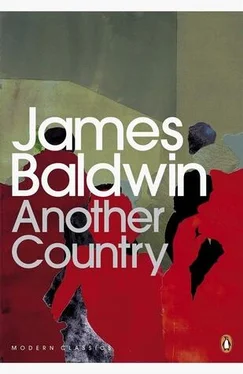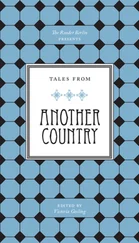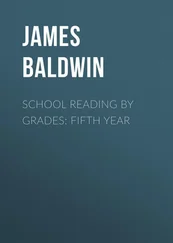He looked out of the window, drying his eyes. They had come out on Lenox Avenue, though their destination was on Seventh; and nothing they passed was unfamiliar because everything they passed was wretched. It was not hard to imagine that horse carriages had once paraded proudly up this wide avenue and ladies and gentlemen, ribboned, be-flowered, brocaded, plumed, had stepped down from their carriages to enter these houses which time and folly had so blasted and darkened. The cornices had once been new, had once gleamed as brightly as now they sulked in shame, all tarnished and despised. The windows had not always been blind. The doors had not always brought to mind the distrust and secrecy of a city long besieged. At one time people had cared about these houses — that was the difference; they had been proud to walk on this Avenue; it had once been home, whereas now it was prison.
Now, no one cared: this indifference was all that joined this ghetto to the mainland. Now, everything was falling down and the owners didn’t care; no one cared. The beautiful children in the street, black-blue, brown, and copper, all with a gray ash on their faces and legs from the cold wind, like the faint coating of frost on a window or a flower, didn’t seem to care, that no one saw their beauty. Their elders, great, trudging, black women, lean, shuffling men, had taught them, by precept or example, what it meant to care or not to care: whatever precepts were daily being lost, the examples remained, all up and down the street. The trudging women trudged, paused, came in and out of dark doors, talked to each other, to the men, to policemen, stared into shop windows, shouted at the children, laughed, stopped to caress them. All the faces, even those of the children, held a sweet or poisonous disenchantment which made their faces extraordinarily definite, as though they had been struck out of stone. The cab sped uptown, past men in front of barber shops, in front of barbeque joints, in front of bars; sped past side streets, long, dark, noisome, with gray houses leaning forward to cut out the sky; and in the shadow of these houses, children buzzed and boomed, as thick as flies on flypaper. Then they turned off the Avenue, west, crawled up a long, gray street. They had to crawl, for the street was choked with unhurrying people and children kept darting out from between the cars which were parked, for the length of the street, on either side. There were people on the stoops, people shouting out of windows, and young men peered indifferently into the slow-moving cab, their faces set ironically and their eyes unreadable.
“Did Rufus ever have you up here?” she asked. “To visit his family, I mean.”
“Yes,” said Vivaldo. “A long time ago. I had almost forgotten it. I had forgotten it until Ida reminded me. She was in pigtails then, the cutest little colored girl you ever saw. She was about fifteen. Rufus and I took her to Radio City.”
She smiled at his description of Ida, and at his tone, which was unconsciously erotic. The cab crossed the Avenue and stopped on the far corner of the block they had come through, where the chapel stood. Two women stood on the steps of the chapel, talking together in low tones. As Cass watched and Vivaldo paid the driver, a young man joined them and they went inside.
Suddenly, with a curse, she put her hand on her uncovered head.
“Vivaldo,” she said, “I can’t go in there.”
He stared at her blankly, while the taxi driver paused in the act of handing him his change.
“What’re you talking about?” he asked. “What’s the matter with you?”
“Nothing. Nothing. But a woman’s head has to be covered . I can’t go in there without a hat.”
“Of course you can!” But at the same moment he remembered that he had never in his life seen a bareheaded woman in a church.
“No, no, I can’t . They’re all wearing hats, all of them. It would be an insult if I didn’t, it would be like coming here in slacks.” She paused. “It’s a church, Vivaldo, it’s a funeral, it would be an insult.”
He had already conceded her point and he stared at her helplessly. The cab driver still held the change and watched Vivaldo with a careful lack of expression.
“Well, haven’t you got a scarf, or something?”
“No.” She dug in her handbag, the pockets of her coat, close to tears. “No. Nothing.”
“Listen, buddy,” the driver said.
Vivaldo’s face lightened. “What about your belt? Can’t you tie that around your head? It’s black.”
“Oh, no. That’ll never work. Besides — they’d know it was my belt.”
“Try it.”
To end the argument and prove her point, she took off her belt and tied it around her head. “You see? It’ll never work.”
“What’re you people going to do?” the driver asked. “I ain’t got all day.”
“I’ll have to buy something,” Cass said.
“We’ll be late.”
“Well, you go on in. I’ll just drive to a store somewhere and I’ll come right back.”
“Ain’t no stores around here, lady,” the driver said.
“Of course there are stores somewhere near here,” Cass said, sharply. “You go on in, Vivaldo; I’ll come right back. What’s the address here?”
Vivaldo gave her the address and said, “You’ll have to go to 125th Street, that’s the only place I know where there are any stores.” Then he took his change from the driver and tipped him. “The lady wants to go to 125th street,” he said.
The driver turned in his seat resignedly, and turned on his meter. “You go on in, Vivaldo,” Cass said again. “I’m sorry. I’ll be right back.”
“You have enough money on you?”
“Yes. Go on in.”
He got out of the cab, looking helpless and annoyed, and turned into the chapel as the cab pulled away. The driver left her at the corner of 125th Street and Eighth Avenue and she realized, as she hurried down the wide, crowded street, that she was in a strange, unnameable state, neither rage nor tears but close to both. One small, lone, white woman hurrying along 125th Street on a Saturday morning was apparently a very common sight, for no one looked at her at all. She did not see any stores with ladies hats in the window. But she was hurrying too fast and looking too hard. If she did not pull herself together, she might very well spend the day wandering up and down this street. For a moment she thought to stop one of the women — one of the women whose faces she watched as though they contained something it was necessary for her to learn — to ask directions. Then she realized that she was mysteriously afraid: afraid of these people, these streets, the chapel to which she must return. She forced herself to walk more slowly. She saw a store and entered it.
A Negro girl came toward her, a girl with red, loosely waved hair, who wore a violently green dress and whose skin was a kind of dusty copper.
“Can I help you?”
The girl was smiling, the same smile — as Cass insisted to herself — that all salesgirls, everywhere, have always worn. This smile made Cass feel poor and shabby indeed. But now she felt it more vehemently than she had ever felt it before. And though she was beginning to shake with a thoroughly mysterious anger, she knew that her dry, aristocratic sharpness, however well it had always worked downtown, would fail of its usual effect here.
“I want,” she stammered, “to see a hat.”
Then she remembered that she hated hats and never wore them. The girl, whose smile had clearly been taught her by masters, looked as though she sold at least one hat, every Saturday morning, to a strange, breathless, white woman.
“Will you come with me?” she asked.
“Well — no,” Cass said, suddenly — and the girl turned, impeccably made up eyebrows arched—“I mean, I don’t really want a hat.” Cass tried to smile; she wanted to run. Silence had fallen over the shop. “I think I’d just like to get a scarf. Black”—and how the word seemed to roll through the shop! — “for my head,” she added, and felt that in another moment they would call the police. And she had no way of identifying herself.
Читать дальше












